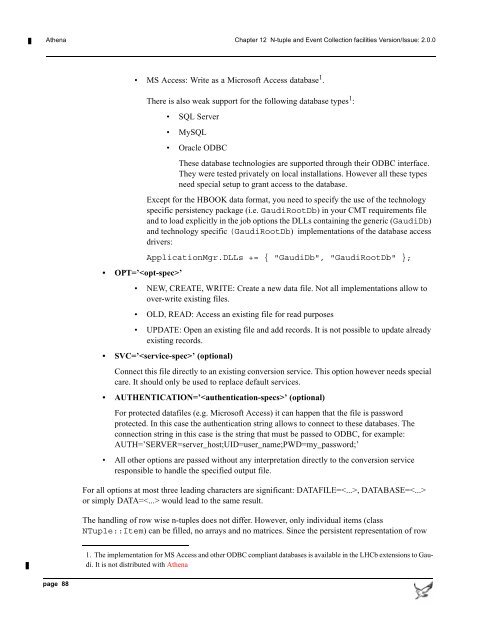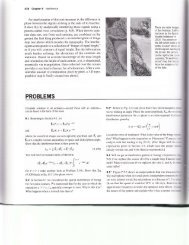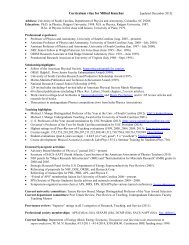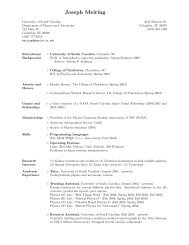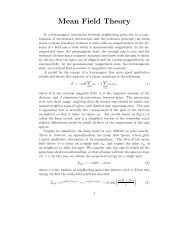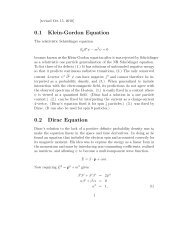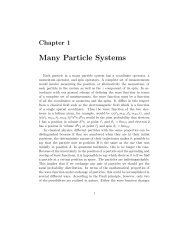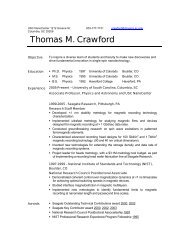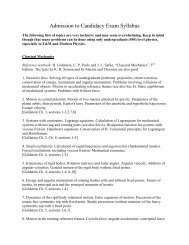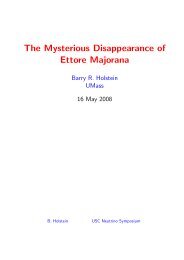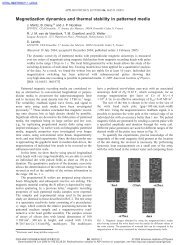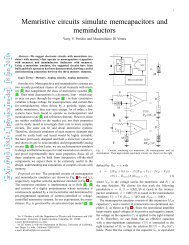Athena Developer Guide
Athena Developer Guide
Athena Developer Guide
You also want an ePaper? Increase the reach of your titles
YUMPU automatically turns print PDFs into web optimized ePapers that Google loves.
<strong>Athena</strong> Chapter 12 N-tuple and Event Collection facilities Version/Issue: 2.0.0<br />
• MS Access: Write as a Microsoft Access database 1 .<br />
• OPT=’’<br />
There is also weak support for the following database types 1 :<br />
• SQL Server<br />
• MySQL<br />
• Oracle ODBC<br />
These database technologies are supported through their ODBC interface.<br />
They were tested privately on local installations. However all these types<br />
need special setup to grant access to the database.<br />
Except for the HBOOK data format, you need to specify the use of the technology<br />
specific persistency package (i.e. GaudiRootDb) in your CMT requirements file<br />
and to load explicitly in the job options the DLLs containing the generic (GaudiDb)<br />
and technology specific (GaudiRootDb) implementations of the database access<br />
drivers:<br />
ApplicationMgr.DLLs += { "GaudiDb", "GaudiRootDb" };<br />
• NEW, CREATE, WRITE: Create a new data file. Not all implementations allow to<br />
over-write existing files.<br />
• OLD, READ: Access an existing file for read purposes<br />
• UPDATE: Open an existing file and add records. It is not possible to update already<br />
existing records.<br />
• SVC=’’ (optional)<br />
Connect this file directly to an existing conversion service. This option however needs special<br />
care. It should only be used to replace default services.<br />
• AUTHENTICATION=’’ (optional)<br />
For protected datafiles (e.g. Microsoft Access) it can happen that the file is password<br />
protected. In this case the authentication string allows to connect to these databases. The<br />
connection string in this case is the string that must be passed to ODBC, for example:<br />
AUTH=’SERVER=server_host;UID=user_name;PWD=my_password;’<br />
• All other options are passed without any interpretation directly to the conversion service<br />
responsible to handle the specified output file.<br />
For all options at most three leading characters are significant: DATAFILE=, DATABASE=<br />
or simply DATA= would lead to the same result.<br />
The handling of row wise n-tuples does not differ. However, only individual items (class<br />
NTuple::Item) can be filled, no arrays and no matrices. Since the persistent representation of row<br />
1. The implementation for MS Access and other ODBC compliant databases is available in the LHCb extensions to Gaudi.<br />
It is not distributed with <strong>Athena</strong><br />
page 88


